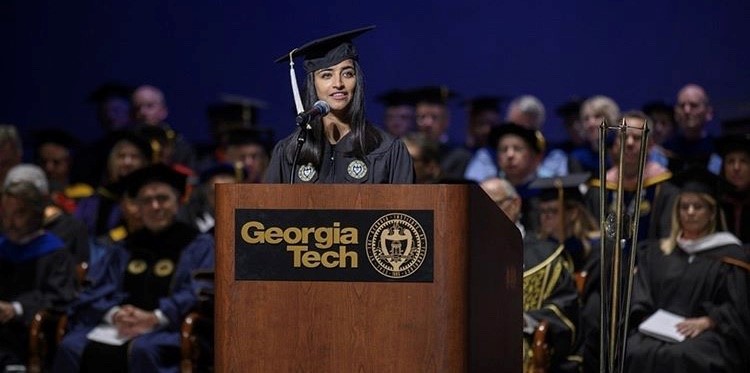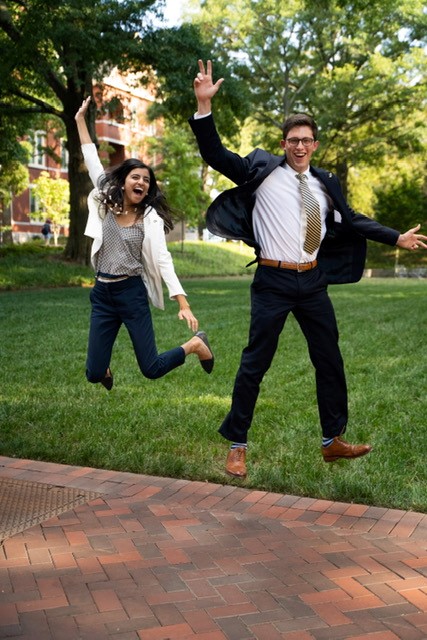Fourth-year Pooja Juvekar is the latest in a long line of Student Government Association (SGA) presidents from the H. Milton Stewart School of Industrial and Systems Engineering (ISyE). Juvekar’s preparation for this position began early in her college career. When she arrived at Tech, she joined FreShGA, an SGA organization that enables first years to gain leadership experience by planning campus-wide events, such as The Final Stand in December. And it was her FreShGA experience, as Juvekar explained in her SGA presidential platform, that began her love for SGA.
From there, Juvekar became the freshman and sophomore representative in the Undergraduate House of Representatives. She also held executive positions in her sorority, in the Georgia Tech chapter of Institute of Industrial & Systems Engineering, and in SGA, where she was vice president of internal affairs. This role meant that she served on then-SGA President Evan Gillon’s executive cabinet and headed up four committees including leadership development and FreShGA.
In deciding to run for the SGA’s top position last spring, Juvekar took all of these experiences into consideration. She also thought about her own leadership style and how she could give back to Georgia Tech. Ultimately, Juvekar was elected president for the 2019-20 academic year; Haigh Angell, a fourth-year economics and international affairs major,was elected alongside her as executive vice president.
In this interview, Juvekar elaborates on her leadership style, details the specific initiatives she’s implementing to address Institute-level challenges, and describes her favorite Tech traditions.
What is your leadership style, and how did that develop?
For me, being a leader has always been about being open-minded, ambitious, and putting other people first. These were all qualities my parents taught me – to work hard and to have a good heart are equally important. Here at Tech, I’ve additionally learned that as a leader, it’s important to listen as much as you talk, and that it matters how you choose to both uplift the people around you and how you execute on tasks and initiatives. In my role as SGA president, there are so many selfless people around me that I’m continuing to learn from – I see that and want to embody that as well.
What are some of the biggest challenges currently facing Georgia Tech?
We have identified general interaction with the Institute’s administration, campus services, and mental health as opportunities for improving communication and collaboration with the student body, as there is often a lot of frustration within these areas.
For example, we know that we need to be evaluating not only how we talk about mental health issues but also the current resources available to students. I’ve been having ongoing conversations with Tiffany Hughes-Troutman, who directs CARE (Center for Assessment, Referral, and Education), as well as fellow student leaders in the mental health space to ensure that operations there are better than they were before.
Also, data is important – tracking things on a long-term timeline. How has CARE improved since it began? How do we make sure the Counseling Center is benefitting everyone and not just one population segment? Are we implementing programs that will last more than two or three years? How do we verify that there is continuous improvement in all of the Student Life-facing operations? I have a systems perspective on things like this, given my ISyE training.
You have also said that as SGA president, you would like to see an increased focus on the arts at Tech. Why is that important in a STEM-heavy environment?
We have so many students who are artistically talented, and I think there’s actually considerable interest in making the arts more prevalent on campus. Emphasizing the arts has a variety of benefits. It helps our students to be well-rounded people and contributes to wellness. Tech has always been a school that prides itself on being innovative, and there so much innovation to be had with how we give students the opportunity to interact with the arts.
The arts committee -- and actually this has already begun under the direction of Genny Kennedy, our wonderful vice president of student life -- works to make art more accessible and apparent in students’ lives and also to make sure that we as an Institute are prioritizing art. That could be something as small as professors talking about a piece of art that is personally meaningful to them in their classes, or working toward bringing all the art organizations together to talk about the gaps in spaces on campus or support given.
What kind of legacy do you want your presidency to have?
I want students to know that SGA is committed to being intentional with how we support students on campus and with the way we address campus issues with the administration. This intentionality doesn’t mean that we have Band-Aid solutions for things, but rather that we try to come up with solutions that are sustainable for a long time.
And also that we have fostered positive relationships with people all across campus, and that students feel in control of their college experience. I want Tech students to recognize that their voices are important, and that SGA cares about them and their ideas.
Outside of your SGA activities, what has been your most meaningful Georgia Tech experience?
I went to Georgia Tech-Lorraine after my sophomore year, and we were in France for the World Cup victory. That was incredibly memorable!
What is your favorite Georgia Tech tradition?
Midnight Bud, the “Horse” at athletic events, and I really love the fight song. There’s a piano version of the song you can find on YouTube, and I have it recorded on my phone – I know I am such a geek!
The cool thing about Georgia Tech traditions is that they’re being created every day. There are fun traditions, like Taste of Latin America or the annual Holi Show put on by all the Indian dance teams. These aren’t the oldest Tech traditions, but they happen every year, and students value them and how they contribute to our campus culture.
When Tech was started, the student body obviously didn’t look the way it does today. Given that, I think that traditions like these help the campus community here now to connect with the Institute as a whole and to connect with one another.
I recently read the book Grit: The Power of Passion and Perseverance by Angela Duckworth, and in it she writes, “When I’m around people, my heart and soul radiate with awareness that I am in the presence of greatness. Maybe greatness unfound or greatness underdeveloped, but the potential or existence of greatness. Nevertheless, you never know who will go on to do good or great things, so treat everyone like they are that person.”
When I read that, I thought about how much that sounds like the people who are here at Georgia Tech. It’s the people who are with you during your college experience that will matter after you graduate. And – going back to traditions – the best Tech traditions connect us all with one another.
For More Information Contact
Shelley Wunder-Smith
H. Milton Stewart School of Industrial and Systems Engineering


